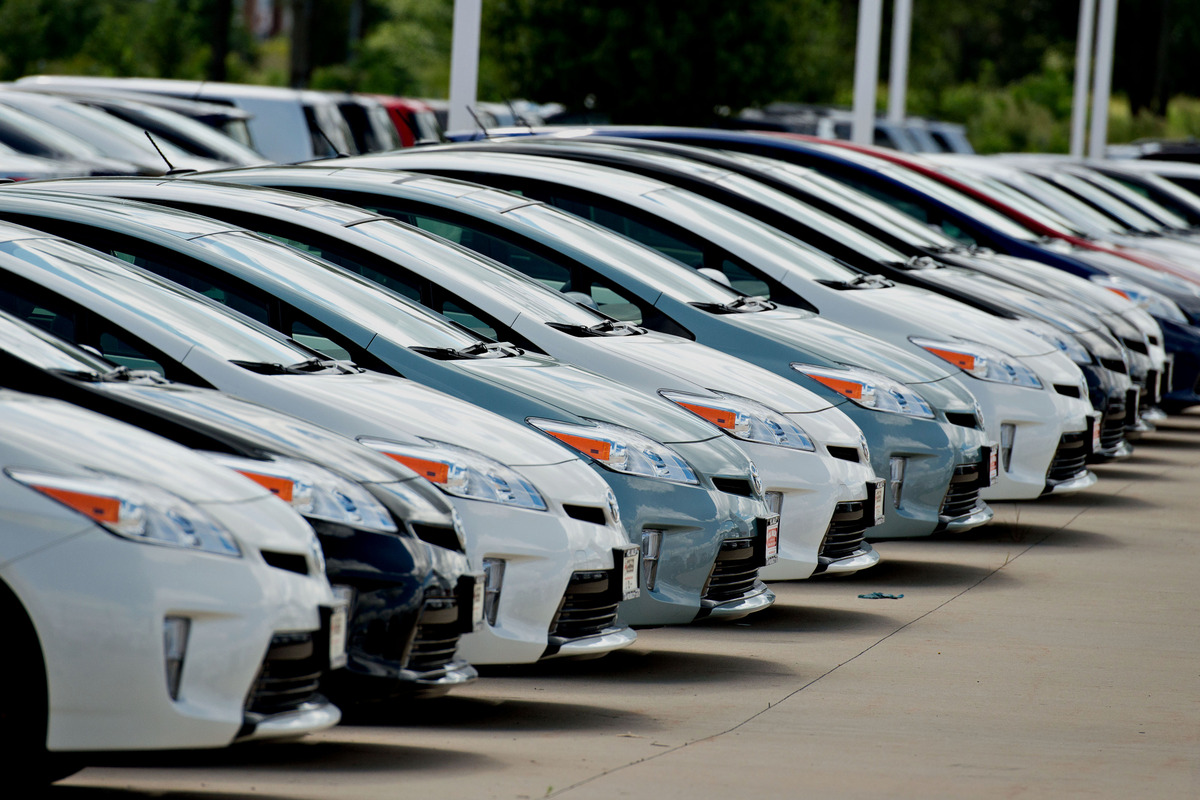Markets
Domestic Production of Vehicles Hit 45,000 Units Per Annum
Published
8 years agoon

- Domestic Production of Vehicles Hit 45,000 Units Per Annum
Like cement, Nigeria appears to be on the track towards becoming vehicles manufacturing country again as local production has increased to 45,000 units per year, up 80 per cent from 25,000.
Based on this growth, PricewaterhouseCoopers (PWC), has projected that the Nigerian auto industry is expected to produce about four million cars annually by 2050.
Also, with this development, Dr. Innocent Chukwuma, Chairman, Innoson Vehicles Manufacturing Limited, IVM, said: “After sometime, Nigeria will manufacture cars for the whole of Africa.”
Recall that in the 1980s,about 120,000 brand new vehicles were being assembled in the country by six assembling plants made up of two car plants and four commercial vehicles plants.
The industry collapsed when government embraced World Trade Organisation’s free trade policy and opened up the country’s borders to imports including second hand vehicles.
Breakdown of the units of vehicles
Investigation revealed that the industry is gradually picking up again as data from National Automotive Design and Development Council (NADDC) has revealed.
The document showed that “Up until 2015, Nigeria imported about 400,000 vehicles (100,000 new and 300,000 used) valued at $4.2 billion. Local production capacity is about 300,000, but utilisation is currently at about 15 percent of installed capacity. This translates to 45,000 units of vehicles per annum.”
NADDC, while not giving the detailed breakdown of the units of vehicles each company produces, said: “The response to the federal government’s automotive policy by the new investors so far has exceeded our expectations.
The current status of implementation of the policy is that the 14 existing assembly plants like VON, PAN, Innoson, Anammco and Leyland-Busan had started assembling new products in 2014, and new ones were established, assembling the following: Nissan, IVM, Peugeot, Hyundai, Honda, Kia, VW, Ford, Changan, GAC, Cars, SUV and light commercial vehicles;Hyundai, IVM, Nissan and Ashok-Leyland buses; MAN, IVM, Sino, Shacman, MAN, FAW, Aston, Foton Forland and Isuzu Trucks; and Proforcearmoured vehicles. The total installed capacity is over 300,000 units per annum.
NADDC said: “By December 2014, the existing assembling plants had commenced operation at various capacity levels to offer existing brands out of new relationship with new Original Equipment Manufacturers (OEM).
Production of Chinese multi-brands
PAN (former Peugeot) in Kaduna resumed the assembling of Peugeot cars, ANAMMCO in Enugu now produces Shacman Trucks of China, Leyland-Busan of Ibadan sustained its production of Chinese multi-brands including NISSAN, VW and HYUNDAI cars and SUV, ASHOK-LEYLAND buses. Innoson Vehicles Manufacturing (IVM) added cars to its commercial vehicle assembly operation; Nissan, VW, Hyundai, kia cars and SUV, Shacman, Sino FAW and MAN Trucks and Ashok-Leyland buses are now assembled in Nigeria.”
Also, it was further learned that 12 new companies, including Honda and Century Auto (Toyota), TATA, Coscharis Auto (FORD, Joylong , Dongfeng), Globe Motors (Higer), Leventis (FOTON-Diamler), KewalramChanrai (GM, Mitsubishi) and Tilad (Shinery), Aston have been given bona-fide manufacturing status and are on track to start assembly operations in Nigeria.
Director General NADDC, Engr. Aminu Jalal, said: “The industry is long-term in nature and requires policy continuity and consistency. This is already assured as the new government has decided to continue with the policy. Nigeria is therefore on track to becoming a vehicle manufacturing nation.”
Hindrances to full capacity utilisations
Investigation further revealed that the existing plants owners are being hindered to fully utilize their production capacities now due to some bottlenecks. Engr. LuqmanMamudu, Director, Policy and Planning at NADDC, said that one of the problems is logistics.
“To order your SemiKnocked Down, SKD, and Completely Knocked Down, CKD, from the sources take quite a while, and the bureaucracy is strangulating, so you find that most of the operators are not able to get their inputs, that is the kits, into their plants as at when due.
Influx of second-hand vehicles
”We also have the problem of second hand vehicles. Something needs to be done about this influx of second-hand vehicles, because second-hand vehicles reduce the market that is available to local investors.”
However, a PWC report presented by a Partner at the firm, Mr. Andrew Nevin, explained that the projected growth requires sustained and effective investments in the auto industry made only possible by the government implementing political, economic and legal policies that create a suitable environment for such investments.
Nevin who did the official presentation of the PWC auto industry report, during a seminar organised by the automobile and allied product group of the Lagos Chamber of Commerce and Industry (LCCI), recently, said “We created three scenarios in this case depending on growth rate and the government support to the auto industry, By 2050, production in this country will hit almost seven million vehicles and imported used vehicles popularly referred to as ‘Tokunbo’ cars will become non-existent by 2034 as a direct result of local production.
“We believe that by 2050, Nigeria should produce over 4 million vehicles. We have also created a pessimistic scenario, which is the third scenario because the world might not turn out the way we think, but even with the pessimistic scenario, Nigeria will be producing about two million vehicles. Essentially, PWC is saying that by 2050, Nigeria is going to be a market that makes at least four million new vehicles a year and would also stop importation of used vehicles.
“There is also going to be the need for experienced car people, Nigeria can achieve its potential to produce over seven million cars by building and working with people that really understand the industry. We believe that the Nigerian auto industry in 2050 would be producing up to four to seven million cars, but it needs the support of the government policies and the industry to do the right things,” he said.
Speaking at the 9th Bola Tinubu Colloquium, with the theme: ‘Make It in Nigeria,’ Chukwuma, Chairman of IVM, said ”most of the companies in Nigeria are assembling cars, but IVM doesn’t assemble,we aremanufacturing cars, not assembling. We are manufacturing cars with the support of Nigerians and after sometime, Nigeria will be manufacturing cars for the whole of Africa.”
Investment incentives
Under the new automotive industry policy, the federal government has put on the table, the following incentives, among others: “Import duty for CKD for vehicle assembly is zero per cent while that of fully built up units is 35 per cent; Import duty for SKD assembly is 10 per cent; import duty for automotive assembly operation equipment is zero per cent. Also, the Nigerian government has mandated all its ministries, agencies and parastatals to patronise the products of local automotive assembly plants.
Is the CEO and Founder of Investors King Limited. He is a seasoned foreign exchange research analyst and a published author on Yahoo Finance, Business Insider, Nasdaq, Entrepreneur.com, Investorplace, and other prominent platforms. With over two decades of experience in global financial markets, Olukoya is well-recognized in the industry.

You may like
-
Nigeria Joins BRICS as Partner Country, Strengthening Global South Cooperation
-
70 Million Poorest of The Poor Nigerians To Get N75,000 From FG
-
Nigeria Surpasses OPEC Quota with 1.51 Million bpd, Targets 2.06 Million in 2025
-
Global Investors Commit $7.6 Billion to Nigeria’s Development at AIF 2024
-
Nigeria-China Trade Strengthened as Grimaldi Introduces Direct Shipping Line
-
Nigeria’s GDP Records 3.46% Growth in Q3 Spurred by Non-Oil Sector













